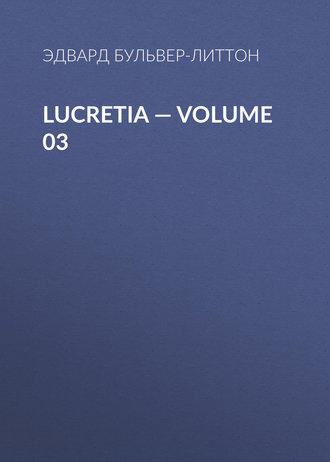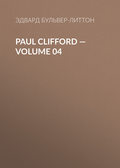
Эдвард Бульвер-Литтон
Lucretia — Volume 03
EPILOGUE TO PART THE FIRST
It is a year since the November day on which Lucretia Clavering quitted the roof of Mr. Fielden. And first we must recall the eye of the reader to the old-fashioned terrace at Laughton,—the jutting porch, the quaint balustrades, the broad, dark, changeless cedars on the lawn beyond. The day is calm, clear, and mild, for November in the country is often a gentle month. On that terrace walked Charles Vernon, now known by his new name of St. John. Is it the change of name that has so changed the person? Can the wand of the Herald's Office have filled up the hollows of the cheek, and replaced by elastic vigour the listless languor of the tread? No; there is another and a better cause for that healthful change. Mr. Vernon St. John is not alone,—a fair companion leans on his arm. See, she pauses to press closer to his side, gaze on his face, and whisper, "We did well to have hope and faith!"
The husband's faith had not been so unshaken as his Mary's, and a slight blush passed over his cheek as he thought of his concession to Sir Miles's wishes, and his overtures to Lucretia Clavering. Still, that fault had been fairly acknowledged to his wife, and she felt, the moment she had spoken, that she had committed an indiscretion; nevertheless, with an arch touch of womanly malice she added softly,—
"And Miss Clavering, you persist in saying, was not really handsome?"
"My love," replied the husband, gravely, "you would oblige me by not recalling the very painful recollections connected with that name. Let it never be mentioned in this house."
Lady Mary bowed her graceful head in submission; she understood Charles's feelings. For though he had not shown her Sir Miles's letter and its enclosure, he had communicated enough to account for the unexpected heritage, and to lessen his wife's compassion for the disappointed heiress. Nevertheless, she comprehended that her husband felt an uneasy twinge at the idea that he was compelled to act hardly to the one whose hopes he had supplanted. Lucretia's banishment from Laughton was a just humiliation, but it humbled a generous heart to inflict the sentence. Thus, on all accounts, the remembrance of Lucretia was painful and unwelcome to the successor of Sir Miles. There was a silence; Lady Mary pressed her husband's hand.
"It is strange," said he, giving vent to his thoughts at that tender sign of sympathy in his feeling,—"strange that, after all, she did not marry Mainwaring, but fixed her choice on that subtle Frenchman. But she has settled abroad now, perhaps for life; a great relief to my mind. Yes, let us never recur to her."
"Fortunately," said Lady Mary, with some hesitation, "she does not seem to have created much interest here. The poor seldom name her to me, and our neighbours only with surprise at her marriage. In another year she will be forgotten!"
Mr. St. John sighed. Perhaps he felt how much more easily he had been forgotten, were he the banished one, Lucretia the possessor! His light nature, however, soon escaped from all thoughts and sources of annoyance, and he listened with complacent attention to Lady Mary's gentle plans for the poor, and the children's school, and the cottages that ought to be repaired, and the labourers that ought to be employed. For though it may seem singular, Vernon St. John, insensibly influenced by his wife's meek superiority, and corrected by her pure companionship, had begun to feel the charm of innocent occupations,—more, perhaps, than if he had been accustomed to the larger and loftier excitements of life, and missed that stir of intellect which is the element of those who have warred in the democracy of letters, or contended for the leadership of States. He had begun already to think that the country was no such exile after all. Naturally benevolent, he had taught himself to share the occupations his Mary had already found in the busy "luxury of doing good," and to conceive that brotherhood of charity which usually unites the lord of the village with its poor.
"I think, what with hunting once a week,—I will not venture more till my pain in the side is quite gone,—and with the help of some old friends at Christmas, we can get through the winter very well, Mary."
"Ah, those old friends, I dread them more than the hunting!"
"But we'll have your grave father and your dear, precise, excellent mother to keep us in order. And if I sit more than half an hour after dinner, the old butler shall pull me out by the ears. Mary, what do you say to thinning the grove yonder? We shall get a better view of the landscape beyond. No, hang it! dear old Sir Miles loved his trees better than the prospect; I won't lop a bough. But that avenue we are planting will be certainly a noble improvement—"
"Fifty years hence, Charles!"
"It is our duty to think of posterity," answered the ci-devant spendthrift, with a gravity that was actually pompous. "But hark! is that two o'clock? Three, by Jove! How time flies! and my new bullocks that I was to see at two! Come down to the farm, that's my own Mary. Ah, your fine ladies are not such bad housewives after all!"
"And your fine gentlemen—"
"Capital farmers! I had no idea till last week that a prize ox was so interesting an animal. One lives to learn. Put me in mind, by the by, to write to Coke about his sheep."
"This way, dear Charles; we can go round by the village,—and see poor Ponto and Dash."
The tears rushed to Mr. St. John's eyes. "If poor Sir Miles could have known you!" he said, with a sigh; and though the gardeners were at work on the lawn, he bowed his head and kissed the blushing cheek of his wife as heartily as if he had been really a farmer.
From the terrace at Laughton, turn to the humbler abode of our old friend the vicar,—the same day, the same hour. Here also the scene is without doors,—we are in the garden of the vicarage; the children are playing at hide-and-seek amongst the espaliers which screen the winding gravel-walks from the esculents more dear to Ceres than to Flora. The vicar is seated in his little parlour, from which a glazed door admits into the garden. The door is now open, and the good man has paused from his work (he had just discovered a new emendation in the first chorus of the "Medea") to look out at the rosy faces that gleam to and fro across the scene. His wife, with a basket in her hand, is standing without the door, but a little aside, not to obstruct the view.
"It does one's heart good to see them," said the vicar, "little dears!"
"Yes, they ought to be dear at this time of the year," observed Mrs.
Fielden, who was absorbed in the contents of the basket.
"And so fresh!"
"Fresh, indeed,—how different from London! In London they were not fit to be seen,—as old as—-I am sure I can't guess how old they were. But you see here they are new laid every morning!"
"My dear," said Mr. Fielden, opening his eyes,—"new laid every morning!"
"Two dozen and four."
"Two dozen and four! What on earth are you talking about, Mrs. Fielden?"
"Why, the eggs, to be sure, my love!"
"Oh," said the vicar, "two dozen and four! You alarmed me a little; 't is of no consequence,—only my foolish mistake. Always prudent and saving, my dear Sarah,—just as if poor Sir Miles had not left us that munificent fortune, I may call it."
"It will not go very far when we have our young ones to settle. And David is very extravagant already; he has torn such a hole in his jacket!"
At this moment up the gravel-walk two young persons came in sight. The children darted across them, whooping and laughing, and vanished in the further recess of the garden.
"All is for the best, blind mortals that we are; all is for the best," said the vicar, musingly, as his eyes rested upon the approaching pair.
"Certainly, my love; you are always right, and it is wicked to grumble.
Still, if you saw what a hole it was,—past patching, I fear!"
"Look round," said Mr. Fielden, benevolently. "How we grieved for them both; how wroth we were with William,—how sad for Susan! And now see them; they will be the better man and wife for their trial."
"Has Susan then consented? I was almost afraid she never would consent. How often have I been almost angry with her, poor lamb, when I have heard her accuse herself of causing her sister's unhappiness, and declare with sobs that she felt it a crime to think of William Mainwaring as a husband."
"I trust I have reasoned her out of a morbid sensibility which, while it could not have rendered Lucretia the happier, must have insured the wretchedness of herself and William. But if Lucretia had not married, and so forever closed the door on William's repentance (that is, supposing he did repent), I believe poor Susan would rather have died of a broken heart than have given her hand to Mainwaring."
"It was an odd marriage of that proud young lady's, after all," said Mrs.
Fielden,—"so much older than she; a foreigner, too!"
"But he is a very pleasant man, and they have known each other so long. I did not, however, quite like a sort of cunning he showed, when I came to reflect on it, in bringing Lucretia back to the house; it looks as if he had laid a trap for her from the first."
"Ten thousand pounds,—a great catch for a foreigner!" observed Mrs. Fielden, with the shrewd instinct of her sex; and then she added, in the spirit of a prudent sympathy equally characteristic: "But I think you say Mr. Parchmount persuaded her to allow half to be settled on herself.
That will be a hold on him."
"A bad hold, if that be all, Sarah. There is a better,—he is a learned man and a scholar. Scholars are naturally domestic, and make good husbands."
"But you know he must be a papist!" said Mrs. Fielden.
"Umph!" muttered the vicar, irresolutely.
While the worthy couple were thus conversing, Susan and her lover, not having finished their conference, had turned back through the winding walk.
"Indeed," said William, drawing her arm closer to his side, "these scruples, these fears, are cruel to me as well as to yourself. If you were no longer existing, I could be nothing to your sister. Nay, even were she not married, you must know enough of her pride to be assured that I can retain no place in her affections. What has chanced was not our crime. Perhaps Heaven designed to save not only us, but herself, from the certain misery of nuptials so inauspicious!"
"If she would but answer one of my letters!" sighed Susan; "or if I could but know that she were happy and contented!"
"Your letters must have miscarried,—you are not sure even of her address. Rely upon it, she is happy. Do you think that she would a second time have 'stooped beneath her'"—Mainwaring's lip writhed as he repeated that phrase—"if her feelings had not been involved? I would not wrong your sister,—I shall ever feel gratitude for the past, and remorse for my own shameful weakness; still, I must think that the nature of her attachment to me was more ardent than lasting."
"Ah, William, how can you know her heart?"
"By comparing it with yours. Oh, there indeed I may anchor my faith! Susan, we were formed for each other! Our natures are alike, save that yours, despite its surpassing sweetness, has greater strength in its simple candour. You will be my guide to good. Without you I should have no aim in life, no courage to front the contests of this world. Ah, this hand trembles still!"
"William, William, I cannot repress a foreboding, a superstition! At night I am haunted with that pale face as I saw it last,—pale with suppressed despair. Oh, if ever Lucretia could have need of us,—need of our services, our affections,—if we could but repair the grief we have caused her!"
Susan's head sank on her lover's shoulder. She had said "need of us," "need of our services." In those simple monosyllables the union was pledged, the identity of their lots in the dark urn was implied.
From this scene turn again; the slide shifts in the lantern,—we are at Paris. In the antechamber at the Tuileries a crowd of expectant courtiers and adventurers gaze upon a figure who passes with modest and downcast eyes through the throng; he has just left the closet of the First Consul.
"Par Dieu!" said B——, "power, like misery, makes us acquainted with strange bedfellows. I should like to hear what the First Consul can have to say to Olivier Dalibard."
Fouche, who at that period was scheming for the return to his old dignities of minister of police, smiled slightly, and answered: "In a time when the air is filled with daggers, one who was familiar with Robespierre has his uses. Olivier Dalibard is a remarkable man. He is one of those children of the Revolution whom that great mother is bound to save."
"By betraying his brethren?" said B——, dryly.
"I do not allow the inference. The simple fact is that Dalibard has spent many years in England; he has married an Englishwoman of birth and connections; he knows well the English language and the English people; and just now when the First Consul is so anxious to approfondir the popular feelings of that strange nation, with whose government he is compelled to go to war, he may naturally have much to say to so acute an observer as Olivier Dalibard."
"Um!" said B——; "with such patronage, Robespierre's friend should hold his head somewhat higher!"
Meanwhile, Olivier Dalibard, crossing the gardens of the palace, took his way to the Faubourg St. Germain. There was no change in the aspect of this man: the same meditative tranquillity characterized his downward eyes and bonded brow; the same precise simplicity of dress which had pleased the prim taste of Robespierre gave decorum to his slender, stooping form. No expression more cheerful, no footstep more elastic, bespoke the exile's return to his native land, or the sanguine expectations of Intellect restored to a career. Yet, to all appearance, the prospects of Dalibard were bright and promising. The First Consul was at that stage of his greatness when he sought to employ in his service all such talent as the Revolution had made manifest, provided only that it was not stained with notorious bloodshed, or too strongly associated with the Jacobin clubs. His quick eye seemed to have discovered already the abilities of Dalibard, and to have appreciated the sagacity and knowledge of men which had enabled this subtle person to obtain the friendship of Robespierre, without sharing in his crimes. He had been frequently closeted with Bonaparte; he was in the declared favour of Fouche, who, though not at that period at the head of the police, was too necessary amidst the dangers of the time, deepened as they were by the rumours of some terrible and profound conspiracy, to be laid aside, as the First Consul had at one moment designed. One man alone, of those high in the State, appeared to distrust Olivier Dalibard,—the celebrated Cambaceres. But with his aid the Provencal could dispense. What was the secret of Dalibard's power? Was it, in truth, owing solely to his native talent, and his acquired experience, especially of England? Was it by honourable means that he had won the ear of the First Consul? We may be sure of the contrary; for it is a striking attribute of men once thoroughly tainted by the indulgence of vicious schemes and stratagems that they become wholly blinded to those plain paths of ambition which common-sense makes manifest to ordinary ability. If we regard narrowly the lives of great criminals, we are often very much startled by the extraordinary acuteness, the profound calculation, the patient, meditative energy which they have employed upon the conception and execution of a crime. We feel inclined to think that such intellectual power would have commanded great distinction, worthily used and guided; but we never find that these great criminals seem to have been sensible of the opportunities to real eminence which they have thrown away. Often we observe that there have been before them vistas into worldly greatness which, by no uncommon prudence and exertion, would have conducted honest men half as clever to fame and power; but, with a strange obliquity of vision, they appear to have looked from these broad clear avenues into some dark, tangled defile, in which, by the subtlest ingenuity, and through the most besetting perils, they might attain at last to the success of a fraud or the enjoyment of a vice. In crime once indulged there is a wonderful fascination, and the fascination is, not rarely, great in proportion to the intellect of the criminal. There is always hope of reform for a dull, uneducated, stolid man, led by accident or temptation into guilt; but where a man of great ability, and highly educated, besots himself in the intoxication of dark and terrible excitements, takes impure delight in tortuous and slimy ways, the good angel abandons him forever.
Olivier Dalibard walked musingly on, gained a house in one of the most desolate quarters of the abandoned faubourg, mounted the spacious stairs, and rang at the door of an attic next the roof. After some moments the door was slowly and cautiously opened, and two small, fierce eyes, peering through a mass of black, tangled curls, gleamed through the aperture. The gaze seemed satisfactory.
"Enter, friend," said the inmate, with a sort of complacent grunt; and as Dalibard obeyed, the man reclosed and barred the door.
The room was bare to beggary; the ceiling, low and sloping, was blackened with smoke. A wretched bed, two chairs, a table, a strong chest, a small cracked looking-glass, completed the inventory. The dress of the occupier was not in keeping with the chamber; true that it was not such as was worn by the wealthier classes, but it betokened no sign of poverty. A blue coat with high collar, and half of military fashion, was buttoned tight over a chest of vast girth; the nether garments were of leather, scrupulously clean, and solid, heavy riding-boots came half-way up the thigh. A more sturdy, stalwart, strong-built knave never excited the admiration which physical power always has a right to command; and Dalibard gazed on him with envy. The pale scholar absolutely sighed as he thought what an auxiliary to his own scheming mind would have been so tough a frame!
But even less in form than face did the man of thews and sinews contrast the man of wile and craft. Opposite that high forehead, with its massive development of organs, scowled the low front of one to whom thought was unfamiliar,—protuberant, indeed, over the shaggy brows, where phrenologists place the seats of practical perception, strongly marked in some of the brutes, as in the dog, but almost literally void of those higher organs by which we reason and imagine and construct. But in rich atonement for such deficiency, all the animal reigned triumphant in the immense mass and width of the skull behind. And as the hair, long before, curled in close rings to the nape of the bull-like neck, you saw before you one of those useful instruments to ambition and fraud which recoil at no danger, comprehend no crime, are not without certain good qualities, under virtuous guidance,—for they have the fidelity, the obedience, the stubborn courage of the animal,—but which, under evil control, turn those very qualities to unsparing evil: bull-dogs to rend the foe, as bull-dogs to defend the master.
For some moments the two men gazed, silently at each other. At length Dalibard said, with an air of calm superiority,—
"My friend, it is time that I should be presented to the chiefs of your party!"
"Chiefs, par tous les diables!" growled the other; "we Chouans are all chiefs, when it comes to blows. You have seen my credentials; you know that I am a man to be trusted: what more do you need?"
"For myself nothing; but my friends are more scrupulous. I have sounded, as I promised, the heads of the old Jacobin party, and they are favourable. This upstart soldier, who has suddenly seized in his iron grasp all the fruits of the Revolution, is as hateful to them as to you. But que voulez vous, mon cher? men are men! It is one thing to destroy Bonaparte; it is another thing to restore the Bourbons. How can the Jacobin chiefs depend on your assurance, or my own, that the Bourbons will forget the old offences and reward the new service? You apprise me- -so do your credentials—that a prince of the blood is engaged in this enterprise, that he will appear at the proper season. Put me in direct communication with this representative of the Bourbons, and I promise in return, if his assurances are satisfactory, that you shall have an emeute, to be felt from Paris to Marseilles. If you cannot do this, I am useless; and I withdraw—"
"Withdraw! Garde a vous, Monsieur le Savant! No man withdraws alive from a conspiracy like ours."
We have said before that Olivier Dalibard was not physically brave; and the look of the Chouan, as those words were said, would have frozen the blood of many a bolder man. But the habitual hypocrisy of Dalibard enabled him to disguise his fear, and he replied dryly,—
"Monsieur le Chouan, it is not by threats that you will gain adherents to a desperate cause, which, on the contrary, requires mild words and flattering inducements. If you commit a violence,—a murder,—mon cher, Paris is not Bretagne; we have a police: you will be discovered."
"Ha, ha! What then? Do you think I fear the guillotine?"
"For yourself, no; but for your leaders, yes! If you are discovered, and arrested for crime, do you fancy that the police will not recognize the right arm of the terrible George Cadoudal; that they will not guess that Cadoudal is at Paris; that Cadoudal will not accompany you to the guillotine?"
The Chouan's face fell. Olivier watched him, and pursued his advantage.
"I asked you to introduce to me this shadow of a prince, under which you would march to a counter-revolution. But I will be more easily contented. Present me to George Cadoudal, the hero of Morbihan; he is a man in whom I can trust, and with whom I can deal. What, you hesitate? How do you suppose enterprises of this nature can be carried on? If, from fear and distrust of each other, the man you would employ cannot meet the chief who directs him, there will be delay, confusion, panic, and you will all perish by the executioner. And for me, Pierre Guillot, consider my position. I am in some favour with the First Consul; I have a station of respectability,—a career lies before me. Can you think that I will hazard these, with my head to boot, like a rash child? Do you suppose that, in entering into this terrible contest, I would consent to treat only with subordinates? Do not deceive yourself. Again, I say, tell your employers that they must confer with me directly, or je m'en lave les mains."
"I will repeat what you say," answered Guillot, sullenly, "Is this all?"
"All for the present," said Dalibard, slowly drawing on his gloves, and retreating towards the door. The Chouan watched him with a suspicious and sinister eye; and as the Provencal's hand was on the latch, he laid his own rough grasp on Dalibard's shoulder,—
"I know not how it is, Monsieur Dalibard, but I mistrust you."
"Distrust is natural and prudent to all who conspire," replied the scholar, quietly. "I do not ask you to confide in me. Your employers bade you seek me: I have mentioned my conditions; let them decide."
"You carry it off well, Monsieur Dalibard, and I am under a solemn oath, which poor George made me take, knowing me to be a hot-headed, honest fellow,—mauvaise tete, if you will,—that I will keep my hand off pistol and knife upon mere suspicion; that nothing less than his word, or than clear and positive proof of treachery, shall put me out of good humour and into warm blood. But bear this with you, Monsieur Dalibard: if I once discover that you use our secrets to betray them; should George see you, and one hair of his head come to injury through your hands,—I will wring your neck as a housewife wrings a pullet's."
"I don't doubt your strength or your ferocity, Pierre Guillot; but my neck will be safe: you have enough to do to take care of your own. Au revoir."
With a tone and look of calm and fearless irony, the scholar thus spoke, and left the room; but when he was on the stairs, he paused, and caught at the balustrade,—the sickness as of terror at some danger past, or to be, came over him; and this contrast between the self-command, or simulation, which belongs to moral courage, and the feebleness of natural and constitutional cowardice, would have been sublime if shown in a noble cause. In one so corrupt, it but betrayed a nature doubly formidable; for treachery and murder hatch their brood amidst the folds of a hypocrite's cowardice.
While thus the interview is going on between Dalibard and the conspirator, we must bestow a glance upon the Provencal's home.
In an apartment in one of the principal streets between the Boulevards and the Rue St. Honore, a boy and a woman sat side by side, conversing in whispers. The boy was Gabriel Varney, the woman Lucretia Dalibard. The apartment was furnished in the then modern taste, which affected classical forms; and though not without a certain elegance, had something meagre and comfortless in its splendid tripods and thin-legged chairs. There was in the apartment that air which bespeaks the struggle for appearances,—that struggle familiar to those of limited income and vain aspirings, who want the taste which smooths all inequalities and gives a smile to home; that taste which affection seems to prompt, if not to create, which shows itself in a thousand nameless, costless trifles, each a grace. No sign was there of the household cares or industry of women. No flowers, no music, no embroidery-frame, no work-table. Lucretia had none of the sweet feminine habits which betray so lovelily the whereabout of women. All was formal and precise, like rooms which we enter and leave,—not those in which we settle and dwell.







